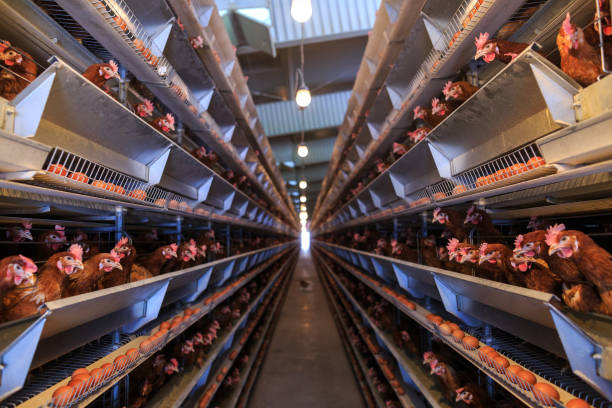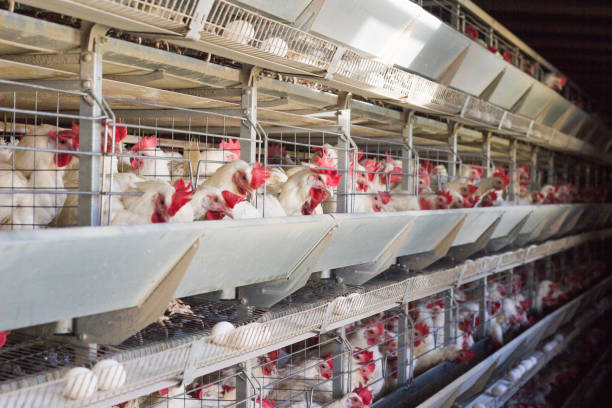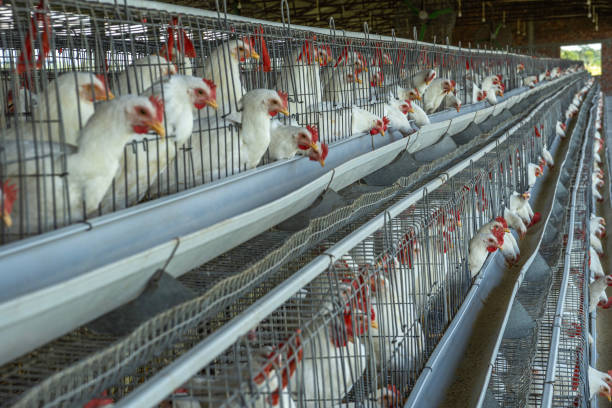
Investing in Success: Choosing the Right Broiler Farming Equipment Suppliers
Investing in Success: Choosing the Right Broiler Farming Equipment Suppliers
The broiler farming industry in Africa is experiencing substantial growth, driven by increasing demand for poultry meat. However, success in this dynamic sector hinges not only on effective management practices but also on selecting the right broiler farming equipment suppliers. This decision is critical, impacting everything from the health and well-being of your birds to the overall profitability of your operation. This article provides a comprehensive guide to choosing the ideal broiler farming equipment supplier, emphasizing the essential factors to consider and pitfalls to avoid.
Understanding Your Needs
Before embarking on the search for a supplier, it’s crucial to thoroughly assess your farm’s specific needs. This involves considering several key factors:
Farm Size and Capacity: The scale of your operation dictates the quantity and type of equipment you require. A small-scale farm will have different needs than a large-scale commercial broiler farm. Consider your existing capacity and future expansion plans.
Climate and Environmental Conditions: African climates vary significantly. Equipment designed for temperate regions may not be suitable for hot, humid, or arid environments. Look for suppliers who offer equipment specifically designed to withstand local climate challenges. Ventilation systems, cooling systems, and insulation materials should be chosen with your local climate in mind.

Budgetary Constraints: Set a realistic budget for your equipment investments. While it’s tempting to opt for the cheapest options, remember that quality and durability are paramount. A higher initial investment in reliable equipment can result in lower maintenance costs and longer lifespan, ultimately yielding better returns.
Specific Broiler Farming Practices: Different farming practices, such as traditional floor rearing or modern cage systems, require different types of equipment. If you’re using a deep litter system, you’ll need equipment for litter management, while cage systems demand specialized cages, feeding systems, and waste removal systems.
Essential Broiler Farming Equipment
The following are some of the essential pieces of equipment required for a successful broiler farming operation:
Brooder Systems: Brooders provide a controlled environment for chicks during their early stages of development, ensuring warmth and protection. Options include gas brooders, infrared lamps, and electric brooders. The choice depends on cost-effectiveness, energy efficiency, and the size of your brooding area.
Feeding Systems: Efficient feeding systems are crucial for optimal growth and feed conversion. Options include manual feeders, automatic chain feeders, and pan feeders. Automatic feeders reduce labor costs and ensure consistent feed distribution, while pan feeders minimize feed wastage.
Drinking Systems: Clean and readily available water is essential for broiler health. Nipple drinkers and bell drinkers are common choices. Nipple drinkers are more hygienic as they reduce water contamination, while bell drinkers are simpler and more affordable.
Ventilation Systems: Adequate ventilation is critical for maintaining air quality, regulating temperature, and preventing disease outbreaks. Options include natural ventilation, fan ventilation, and tunnel ventilation. Fan ventilation systems can be further categorized into exhaust fans and circulation fans.
Cooling Systems: In hot climates, cooling systems are essential for preventing heat stress and maintaining optimal broiler performance. Options include evaporative cooling pads, fogging systems, and misting systems. Evaporative cooling pads are highly effective, while fogging and misting systems are more affordable.
Heating Systems: In colder climates, heating systems are important. Options include radiant heaters, forced-air heaters, and space heaters. Radiant heaters provide direct heat, while forced-air heaters distribute heat evenly throughout the house.
Lighting Systems: Proper lighting is essential for stimulating growth and regulating broiler activity. LED lights and fluorescent lights are commonly used. LED lights are more energy-efficient and have a longer lifespan, while fluorescent lights are more affordable.
Waste Management Systems: Efficient waste management is crucial for hygiene and environmental sustainability. Options include manual cleaning, mechanical scrapers, and manure belts. Mechanical scrapers reduce labor costs, while manure belts offer continuous waste removal.
Cages Systems: Cage systems allow for increased stocking density and better control over the environment. These systems typically include cages, automatic feeding systems, automatic drinking systems, and automatic manure removal systems.
Key Considerations When Choosing a Supplier
Now, let’s focus on what to look for in a reliable broiler farming equipment supplier:
Experience and Reputation: Choose a supplier with a proven track record in the industry. Look for companies with extensive experience in providing equipment to broiler farms, particularly in African countries. Check online reviews, testimonials, and references to gauge their reputation and customer satisfaction. A well-established company with a strong reputation is more likely to provide reliable products and excellent customer service.
Product Quality and Durability: Don’t compromise on quality. Ensure the equipment is made from durable materials and designed to withstand the rigors of broiler farming. Inquire about the manufacturer’s quality control processes and warranty policies. High-quality equipment may have a higher upfront cost, but it offers better long-term value.
Adaptability to Local Conditions: As mentioned earlier, African climates vary significantly. Ensure the equipment is specifically designed for your local climate. Ask the supplier about the materials used, the ventilation design, and other features that contribute to climate resilience.

Technical Support and After-Sales Service: A reliable supplier should offer comprehensive technical support and after-sales service. This includes installation assistance, training, maintenance services, and readily available spare parts. Inquire about the supplier’s service network and response time for technical issues.
Pricing and Payment Terms: While price is important, it shouldn’t be the sole deciding factor. Compare quotes from multiple suppliers, but prioritize quality and service. Discuss payment terms and financing options. Some suppliers may offer flexible payment plans or partnerships with financial institutions.
Compliance with Standards: Ensure the equipment complies with relevant industry standards and safety regulations. This is particularly important for electrical and mechanical components. Ask the supplier for certifications and test reports to verify compliance.
Customization Options: Sometimes, off-the-shelf solutions may not perfectly fit your needs. Choose a supplier that offers customization options to tailor the equipment to your specific requirements. This may include modifying cage sizes, adjusting feeding system configurations, or adapting ventilation designs.
Warranty and Guarantees: Always inquire about the warranty offered on the equipment. A comprehensive warranty protects you against defects and malfunctions. Understand the terms and conditions of the warranty, including the duration and the covered components.
Local Presence and Support: While many suppliers may operate internationally, having a local presence in Africa can be a significant advantage. Local offices or partnerships can provide faster response times for technical support, spare parts delivery, and on-site assistance.
Common Pitfalls to Avoid
Choosing the Cheapest Option: The temptation to save money by opting for the cheapest equipment can be detrimental in the long run. Low-quality equipment is more prone to breakdowns, requires more frequent maintenance, and has a shorter lifespan. This can result in higher operating costs and reduced profitability.
Ignoring Climate Considerations: Failing to consider the local climate when selecting equipment can lead to significant problems. Equipment designed for temperate climates may not function efficiently in hot or humid environments, resulting in poor broiler performance and increased energy consumption.
Neglecting After-Sales Service: Ignoring the importance of after-sales service can leave you stranded when problems arise. If your supplier doesn’t offer adequate technical support and spare parts, you may face lengthy downtime and production losses.
Failing to Research the Supplier: Not conducting thorough research on the supplier’s experience, reputation, and capabilities can lead to disappointment. Always check online reviews, testimonials, and references before making a decision.
Overlooking Maintenance Requirements: Neglecting the maintenance requirements of the equipment can shorten its lifespan and increase the risk of breakdowns. Choose equipment that is easy to maintain and ensure you have access to the necessary training and spare parts.
The Livi Machinery Advantage

Livi Machinery is a leading supplier of broiler farming equipment, specializing in providing solutions tailored to the specific needs of African farmers. With years of experience in the poultry industry, Livi Machinery offers a wide range of high-quality equipment, including brooder systems, feeding systems, drinking systems, ventilation systems, cooling systems, heating systems, lighting systems, and waste management systems.
Livi Machinery stands out due to:
Durable and Climate-Resistant Equipment: Livi Machinery’s equipment is manufactured using high-quality materials and designed to withstand the harsh conditions of African climates. Their ventilation systems, cooling systems, and insulation materials are specifically engineered to optimize broiler performance in hot and humid environments.
Customizable Solutions: Livi Machinery understands that every farm is unique. They offer customizable solutions to tailor the equipment to your specific needs and requirements. This includes modifying cage sizes, adjusting feeding system configurations, and adapting ventilation designs.
Comprehensive Technical Support: Livi Machinery provides comprehensive technical support and after-sales service. Their team of experienced technicians offers installation assistance, training, maintenance services, and readily available spare parts.
Competitive Pricing: Livi Machinery offers competitive pricing without compromising on quality. They understand the importance of affordability for African farmers and strive to provide cost-effective solutions that deliver excellent value.
Commitment to Sustainability: Livi Machinery is committed to sustainable farming practices. Their equipment is designed to minimize waste, conserve energy, and reduce the environmental impact of broiler farming.
Conclusion
Choosing the right broiler farming equipment supplier is a critical decision that can significantly impact the success of your operation. By carefully considering your needs, researching potential suppliers, and avoiding common pitfalls, you can make an informed choice that sets you up for long-term profitability. Partnering with a reliable supplier like Livi Machinery can provide you with the high-quality equipment, technical support, and after-sales service you need to thrive in the dynamic broiler farming industry. Remember that investing in quality and reliability is an investment in the future of your farm. Don’t compromise on the essentials – your broilers, your business, and your bottom line will thank you for it.
